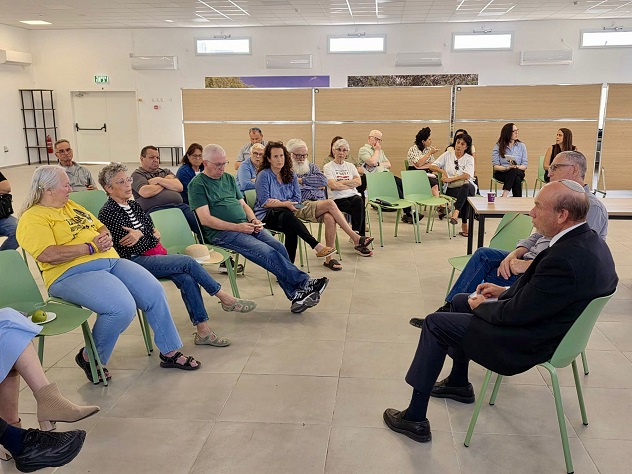Comptroller Englman met with residents of Kibbutz Nir Oz, a quarter of whose members were either murdered or kidnapped: “The State Audit will monitor the development and implementation of rehabilitation frameworks.”
On May 7, 2025, State Comptroller and Ombudsman Matanyahu Englman met with displaced residents of Kibbutz Nir Oz who are currently living in Karmei Gat. The kibbutz leadership and members raised numerous gaps across a range of areas concerning the government's treatment of the community – a community that lost a quarter of its residents to murder or abduction, and where most homes were destroyed or vandalized.
At the start of the meeting, residents demanded the return of 14 hostages from Kibbutz Nir Oz and all 59 remaining hostages. According to the residents, “the terrorists erased the kibbutz. Nir Oz is the test of whether the State will rebuild – its restoration is the victory. If the kibbutz is not rehabilitated and no community is reestablished there, then Hamas has won the war.”
Residents expressed deep concern over the lack of government support, both for those currently living in Karmei Gat and for others who are unable to return to Nir Oz due to trauma. They stressed the urgent need to establish clarity and certainty for all kibbutz members regarding the services and assistance they require.
Also present at the meeting was Margalit Moses, who was kidnapped from Nir Oz and held hostage for 49 days in Hamas captivity in the tunnels of Khan Younis, before being released in the first hostage deal.
Moses expressed frustration that since her return from Hamas captivity, no one from the government had contacted or followed up with her. She said: “Beyond the joy of seeing an Israeli soldier bringing us back to Israel, no Israeli official who reached out to me. No one — until now — from any ministry. That’s not right. They should have gathered those who returned, said something, even just a word. There wasn’t even a ‘welcome back,’ except from the IDF soldiers who received us. There is one person from National Insurance who assists me; but other than that, no government agency has contacted me. Not even during the period we were in the hospital.”
In response to comments by Hadas Calderon, whose two sons and their father are survivors of captivity — and who called for an audit into the government’s handling of the hostage crisis — Comptroller Englman replied: “The pain that cries out from you is very clear and deeply resonant.”
The Comptroller reiterated that an audit is currently underway examining the government’s conduct toward the hostages and their families.
According to Calderon, “there is no one in charge who sees the full picture. We find ourselves in charge of this affair and pulling all the strings. There needs to be someone overseeing it all. In addition, it must be taken into account that there will be people in the community who are afraid to return to the kibbutz. It’s not that they don’t want to, but they’re afraid, because obviously we went through so much there. Where is the care for them? What about them? People find themselves no longer young, without a home, and with no guarantees for the future.”
Comptroller Englman concluded by saying: “I hear your words with deep sorrow. The most significant gap is regarding those who, for whatever reason, wish to live elsewhere. This issue is front of mind for me, and the gap here is a serious one. The government has an obligation to create a rehabilitation pathway for Gaza Envelope residents affected by October 7 in whatever place they choose to live. It is clear to all that each person copes differently with what they experienced. This matter lies at the government’s doorstep. The State Audit will monitor the development and implementation of these rehabilitation frameworks.”
“This is a national obligation, along with the understanding that a community whose members include hostages requires a government response tailored to its specific needs.”
“I thank you as well for your openness and for the issues you raised. We will follow up on how the various government bodies respond, to help improve the services you receive from the public sector.”












